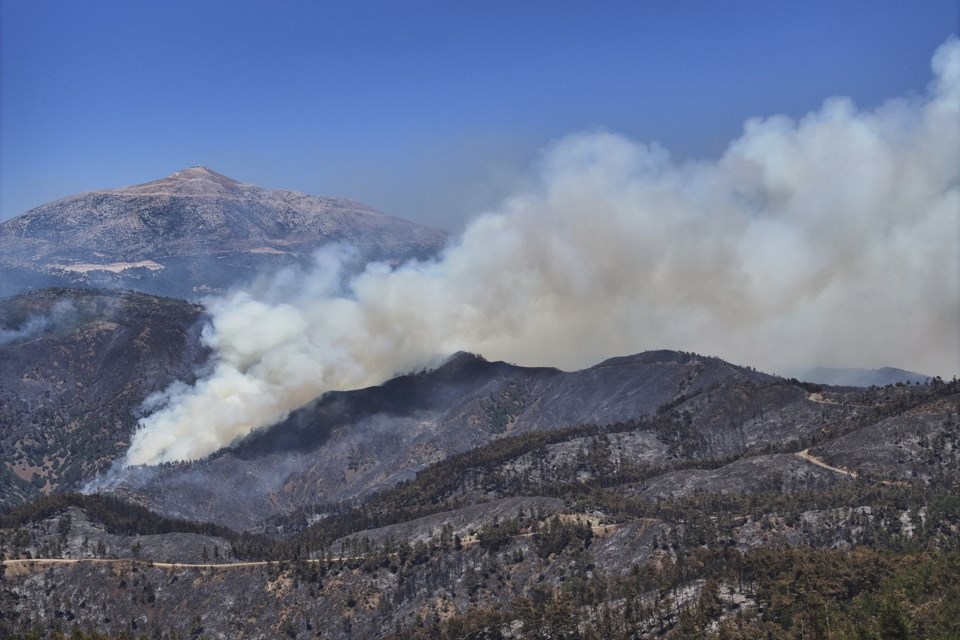LATAKIA, Syria (AP) — Some of Syria’s worst wildfires in years have been brought under control as of Sunday, according to the Civil Defense and the Ministry of Emergency and Disaster Management, following days of grueling firefighting in the forested countryside of the coastal Latakia province.
The blazes, which started 10 days ago and swept through the heavily wooded area of several mountain ranges, were fanned by strong winds, scorching summer heat and unexploded ordnance left behind from the country’s 13-year civil war.
Firefighters faced hazardous conditions with support from aerial teams and engineering units working to open firebreaks in the dense terrain.
In a statement, the Civil Defense said the spread of the fire was halted on Sunday morning, following “extensive efforts by firefighting teams and both helicopter and glider aircraft.” Crews remain on the ground conducting cooling operations and monitoring the area to prevent new flare-ups, it added.
More than 15,000 hectares of forest were burned, according to Abed al-Kafi Kayal, a civil defense team leader. “There are no injuries among residents,” he told The Associated Press. “Some firefighters were hurt, mostly from slipping, road conditions or the intensity of the flames.”
Firefighting helicopters swept low over ridgelines on Saturday, dumping water onto hotspots as ground crews worked below to contain flare-ups. Among the pilots were defectors who had left the Syrian Air Force in 2012 during the uprising against President Bashar Assad. Now, some have rejoined under the new government and are contributing to the emergency effort.
Col. Ameen al-Ameen, who returned to service after 14 years, said his team has been flying “day and night” for 10 consecutive days. “We are extinguishing fires and doing our duty toward our country and people, who need us after this long period,” he said.
By Saturday evening, teams had successfully contained hotspots on all fronts. The civil defense statement praised the “tremendous efforts” of Syrian firefighters along with Turkish and Arab support teams, and noted that roads and fire lines were being cut through the forest to help prevent future spread.
Minister of Emergency and Disaster Management Raed al-Saleh said the firefighting efforts had reached a “promising stage” by Saturday night. “The scene is changing, the smoke is clearing and teams continue working intensively to extinguish remaining hotspots,” he said.
The United Nations also stepped in to support the emergency response. U.N. Resident and Humanitarian Coordinator in Syria, Adam Abdelmoula, announced on Thursday the allocation of $625,000 from the Syria Humanitarian Fund to assist those affected.
Initial U.N. assessments suggest thousands have been displaced, with significant damage to farmland, infrastructure, and livelihoods in the coastal region. U.N. agencies said they are coordinating closely with local authorities and stand ready to mobilize further aid if needed.
“The wildfires have had catastrophic consequences on the local communities and require our immediate attention,” said Abdelmoula. He called on international donors to step up, warning that “timely and flexible funding is critical to saving lives and protecting communities in moments of crisis.”
Al-Saleh praised the assistance of firefighting teams from Turkey, Jordan, Lebanon, Iraq, and Qatar.
“We promise our people that we will not leave until the last spark has been extinguished,” he said.
Summer fires are common in the eastern Mediterranean region, where experts warn that climate change is intensifying conditions that lead to blazes.
Also, below-average rainfall over the winter left Syrians struggling with water shortages this summer, as the springs and rivers that normally supply much of the population with drinking water have gone dry.
Ghaith Alsayed And Sally Abou Aljoud, The Associated Press



